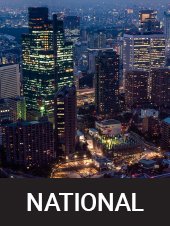Canadians split among age groups as well as party lines in casting their votes in Monday’s federal election, exit polls suggested, with different issues driving their choices.
Exit polls conducted by Ipsos exclusively for Global News found Canadians aged 55 and older leaned toward the Liberals, who were seen as the party that would best handle U.S. President Donald Trump and his fraying of the Canada-U.S. relationship.
Younger Canadians aged 18 to 34, meanwhile, picked the Conservatives, based on their perception of who would best address affordability and the rising cost of living.
“What we’ve got are two groups of people: one who remembers a Canada that worked wonderfully (in the 1970s and 1980s) … that Canada is not the Canada of young people today, who don’t identify with that,” said Darrell Bricker, CEO of Ipsos Public Affairs.
Global News is projecting the Liberals under Mark Carney will form a minority government, while the Conservatives were seen to be improving on their last two election performances but also saw Leader Pierre Poilievre lose his Ottawa-area riding of Carleton, which he had held for 20 years.
Both parties gained seats largely at the expense of the New Democrats, which saw their vote share drop to single digits.
The exit poll results suggest the top issue driving the vote of older Canadians was Canada’s relationship with the U.S., with 43 per cent of Canadians aged 55 and over saying so, above the economy and affordability.

Get daily National news
Get the day’s top news, political, economic, and current affairs headlines, delivered to your inbox once a day.
The Liberals were overwhelmingly seen as the party best equipped to handle that issue, according to Ipsos — leading the Conservatives by 65 points overall.
Conversely, voters aged 18 to 34 saw affordability and the cost of living as their top issue at 42 per cent, followed by housing, health care and the economy. Just 18 per cent of younger voters said their choice was inspired by the Canada-U.S. relationship.
Ipsos found Conservatives leading the Liberals on economic issues, particularly cost of living and “kitchen table” economics — though by a much smaller margin, at five points, than what the Liberals enjoyed on the U.S. issue.
“What we saw tonight were those two issues colliding and we ended up with a (likely) minority government as a result,” Bricker said on Monday night.
As of 11:18 a.m. eastern on Tuesday, the Liberals were projected to be elected or leading in roughly 168 ridings, which is just shy of the 172 seats required for a majority government.
Overall, 38 per cent of Canadians surveyed after casting their vote said affordability and the cost of living drove their choice, while 23 per cent said it was U.S. relations. The economy and housing were also in the top four issues driving Canadians’ votes.
Notably, 48 per cent of all voters told Ipsos that Canada is heading in the wrong direction after 10 years of Liberal government, while one-third said the country was on the right track.
One-fifth of voters said they strongly agreed with Poilievre’s oft-repeated suggestion that Canada is “broken,” while around one-quarter said they either somewhat agree, somewhat disagree or strongly disagree.
Bricker said that context will make it “difficult” for the next Liberal government to lead on issues besides the U.S. relationship.
© 2025 Global News, a division of Corus Entertainment Inc.
Read the full article here
